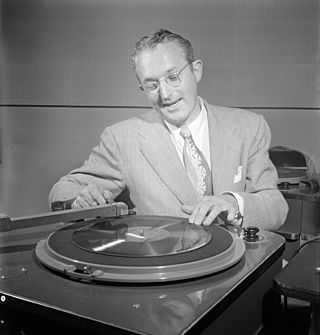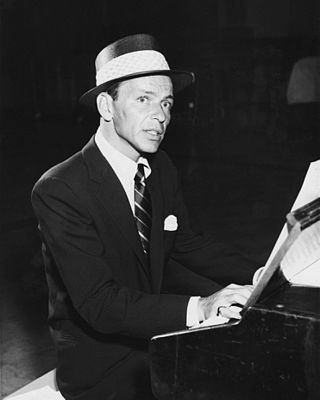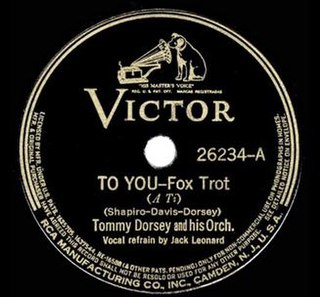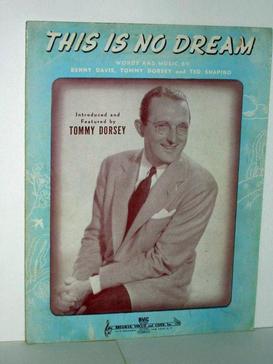
Thomas Francis Dorsey Jr. was an American jazz trombonist, composer, conductor and bandleader of the big band era. He was known as the "Sentimental Gentleman of Swing" because of his smooth-toned trombone playing. His theme song was "I'm Getting Sentimental Over You". His technical skill on the trombone gave him renown among other musicians. He was the younger brother of bandleader Jimmy Dorsey. After Dorsey broke with his brother in the mid-1930s, he led an extremely successful band from the late 1930s into the 1950s. He is best remembered for standards such as "Opus One", "Song of India", "Marie", "On Treasure Island", and his biggest hit single, "I'll Never Smile Again".

"Stardust" is a 1927 song composed by Hoagy Carmichael, with lyrics later added by Mitchell Parish. It has been recorded as an instrumental or vocal track over 1,500 times. Carmichael developed a taste for jazz while attending Indiana University. He formed his own band and played at local events in Indiana and Ohio. Following his graduation, Carmichael moved to Florida to work for a law firm. He left the law sector and returned to Indiana, after learning of the success of one of his compositions. In 1927, after leaving a local university hangout, Carmichael started to whistle a tune that he later developed further. When composing the song, he was inspired by the end of one of his love affairs, and on the suggestion of a university classmate, he decided on its title. The same year, Carmichael recorded an instrumental version of the song for Gennett Records.

Nelson Smock Riddle Jr. was an American arranger, composer, bandleader and orchestrator whose career stretched from the late 1940s to the mid-1980s. He worked with many vocalists at Capitol Records, including Frank Sinatra, Ella Fitzgerald, Nat King Cole, Judy Garland, Dean Martin, Peggy Lee, Johnny Mathis, Rosemary Clooney and Keely Smith. He scored and arranged music for many films and television shows, earning an Academy Award and three Grammy Awards. He found commercial and critical success with a new generation in the 1980s, in a trio of Platinum albums with Linda Ronstadt.

Jo Elizabeth Stafford was an American traditional pop singer, whose career spanned five decades from the late 1930s to the early 1980s. Admired for the purity of her voice, she originally underwent classical training to become an opera singer before following a career in popular music, and by 1955 had achieved more worldwide record sales than any other female artist. Her 1952 song "You Belong to Me" topped the charts in the United States and United Kingdom, becoming the second single to top the UK Singles Chart, and the first by a female artist to do so.
Ruth Lowe was a Canadian pianist and songwriter. She composed the first Billboard top 80 song "I'll Never Smile Again".

I Remember Tommy... is an album by Frank Sinatra, released in 1961. It was recorded as a tribute to bandleader Tommy Dorsey, and consists of re-recorded versions of songs that Sinatra had first performed or recorded with Dorsey earlier in his career. Fellow Dorsey alumnus Sy Oliver arranged and conducted the sessions.
"I'm Getting Sentimental over You" is a song recorded by Tommy Dorsey and His Orchestra. The words were written by Ned Washington and the music was written by George Bassman. It was first performed in 1932. The original copyright is dated 1933 and issued to Lawrence Music Publishers, Inc. The copyright was assigned to Mills Music, Inc. in 1934. Noni Bernardi, a saxophonist with the Dorsey orchestra arranged this song.
"Fools Rush In" (1940) is a popular song. The lyrics were written by Johnny Mercer with music by Rube Bloom.
"The One I Love (Belongs to Somebody Else)" is a popular song composed by Isham Jones with lyrics by Gus Kahn. The song was recorded by Isham Jones' Orchestra on December 21, 1923, at Brunswick Studios in New York City, and published on January 7, 1924. On January 17 in Chicago, Jones recorded another version, with Al Jolson on lead vocals. Both versions made the charts that Spring, with Jolson's peaking at number 2, and Jones' at number 5. Sophie Tucker recorded her version February 1924, released on Okeh 40054.
"I Had the Craziest Dream" is a popular song which was published in 1942. The music was written by Harry Warren, the lyrics by Mack Gordon.

"Chicago" is a popular song written by Fred Fisher and published in 1922. The original sheet music variously spelled the title "Todd'ling" or "Toddling." The song has been recorded by many artists, but the best-known versions are by Frank Sinatra, Ben Selvin and Judy Garland. The song alludes to the city's colorful past, feigning "... the surprise of my life / I saw a man dancing with his own wife", mentioning evangelist Billy Sunday as having not been able to "shut down" the city, and State Street where "they do things they don't do on Broadway".
"East of the Sun " is a popular song written by Brooks Bowman, an undergraduate member of Princeton University's Class of 1936, for the 1934 production of the Princeton Triangle Club's production of Stags at Bay. It was published in 1934 by Santly Bros. and soon became a hallmark of the Princeton Tigertones, Princeton University's signature all-male a cappella group. The standard is also sung by the Princeton Nassoons.

Frank Sinatra & the Tommy Dorsey Orchestra is a 1998 compilation album by the American singer Frank Sinatra.

Frank Sinatra's musical career began in the swing era in 1935, and ended in 1995, although he did briefly retire in 1971, before returning to music in 1973. Sinatra is one of the most influential music artists of the 20th century, and has sold 150 million records worldwide, making him one of the best-selling music artists of all-time. Rock critic Robert Christgau called Sinatra "the greatest singer of the 20th century". In addition to his music career, Sinatra was also a successful film actor, having won the Academy Award for Best Supporting Actor for his role as Private Angelo Maggio in From Here to Eternity (1953).
"Laura" is a 1945 popular song. The music, composed by David Raksin for the 1944 movie Laura, which starred Gene Tierney and Dana Andrews, is heard frequently in the movie. The film's director, Otto Preminger, had originally wanted to use Duke Ellington's "Sophisticated Lady" as the theme, but Raksin was not convinced that it was suitable. Angered, Preminger gave Raksin one weekend to compose an alternative melody. Raksin later said, and maintained for the rest of his days, that when, over that weekend, his wife sent him a "Dear John" letter, the haunting theme seemed to write itself.
"Stella by Starlight" is a popular song by Victor Young that was drawn from thematic material composed for the main title and soundtrack of the 1944 Paramount Pictures film The Uninvited. Appearing in the film's underscore as well as in source music as an instrumental theme song without lyrics, it was turned over to Ned Washington, who wrote the lyrics for it in 1946. The title had to be incorporated into the lyrics, which resulted in its unusual placement: the phrase appears about three-quarters of the way through the song, rather than at the beginning or the end.

"Whispering" is a popular song published in 1920 by Sherman, Clay & Co. of San Francisco. The 1920 copyright attributes the lyrics to Malvin Schonberger and the music to John Schonberger.

"To You" is a 1939 song composed by Tommy Dorsey with Benny Davis and Ted Shapiro. The song was a top 10 hit on the Billboard charts.

"This Is No Dream" is a 1939 song co-written by Tommy Dorsey with Benny Davis and Ted Shapiro and released as a 78 single by his orchestra.

"This Love of Mine" is a popular American song that was first recorded in 1941 by Tommy Dorsey and His orchestra, with a vocal by Frank Sinatra. Sinatra wrote the words and Sol Parker and Hank Sanicola wrote the music.












